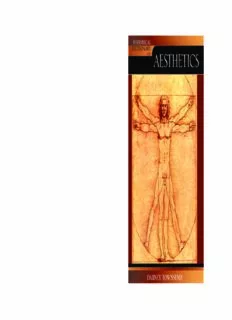
Historical Dictionary of Aesthetics (Historical Dictionaries of Religions, Philosophies and Movements) PDF
Preview Historical Dictionary of Aesthetics (Historical Dictionaries of Religions, Philosophies and Movements)
HISTORICAL DICTIONARY OF AESTHETICS DABNEY TOWNSEND HISTORICAL DICTIONARIES OF RELIGIONS, PHILOSOPHIES, AND MOVEMENTS JonWoronoff,SeriesEditor 1. Buddhism,byCharlesS.Prebish,1993 2. Mormonism,byDavisBitton,1994.Outofprint.Seeno.32. 3. EcumenicalChristianity,byAnsJoachimvanderBent,1994 4. Terrorism,bySeanAndersonandStephenSloan,1995.Outofprint.Seeno. 41. 5. Sikhism,byW.H.McLeod,1995.Outofprint.Seeno.59. 6. Feminism,byJanetK.BolesandDianeLongHoeveler,1995.Outofprint.See no.52. 7. OlympicMovement,byIanBuchananandBillMallon,1995.Outofprint.See no.39. 8. Methodism,byCharlesYrigoyenJr.andSusanE.Warrick,1996.OutofPrint. Seeno.57. 9. OrthodoxChurch,byMichaelProkurat,AlexanderGolitzin,andMichaelD. Peterson,1996 10. OrganizedLabor,byJamesC.Docherty,1996.Outofprint.Seeno.50. 11. CivilRightsMovement,byRalphE.Luker,1997 12. Catholicism,byWilliamJ.Collinge,1997 13. Hinduism,byBruceM.Sullivan,1997 14. NorthAmericanEnvironmentalism,byEdwardR.WellsandAlanM. Schwartz,1997 15. WelfareState,byBentGreve,1998.Outofprint.Seeno.63. 16. Socialism,byJamesC.Docherty,1997.Outofprint.Seeno.73. 17. Baha´’´ıFaith,byHughC.AdamsonandPhilipHainsworth,1998.Outofprint. Seeno.71. 18. Taoism,byJulianF.PasincooperationwithManKamLeung,1998 19. Judaism,byNormanSolomon,1998.Outofprint.Seeno.69. 20. GreenMovement,byElimPapadakis,1998 21. Nietzscheanism,byCarolDiethe,1999 22. GayLiberationMovement,byRonaldJ.Hunt,1999 23. IslamicFundamentalistMovementsintheArabWorld,Iran,andTurkey,by AhmadS.Moussalli,1999 24. ReformedChurches,byRobertBenedetto,DarrellL.Guder,andDonaldK. McKim,1999 25. Baptists,byWilliamH.Brackney,1999 26. CooperativeMovement,byJackShaffer,1999 27. ReformationandCounter-Reformation,byHansJ.Hillerbrand,2000 28. Shakers,byHolleyGeneDuffield,2000 29. UnitedStatesPoliticalParties,byHaroldF.BassJr.,2000 30. Heidegger’sPhilosophy,byAlfredDenker,2000 31. Zionism,byRafaelMedoffandChaimI.Waxman,2000 32. Mormonism,2nded.,byDavisBitton,2000 33. Kierkegaard’sPhilosophy,byJuliaWatkin,2001 34. HegelianPhilosophy,byJohnW.Burbidge,2001 35. Lutheranism,byGu¨ntherGassmannincooperationwithDuaneH.Larsonand MarkW.Oldenburg,2001 36. HolinessMovement,byWilliamKostlevy,2001 37. Islam,byLudwigW.Adamec,2001 38. Shinto,byStuartD.B.Picken,2002 39. OlympicMovement,2nded.,byIanBuchananandBillMallon,2001.Outof Print.Seeno.61. 40. SlaveryandAbolition,byMartinA.Klein,2002 41. Terrorism,2nded.,bySeanAndersonandStephenSloan,2002 42. NewReligiousMovements,byGeorgeD.Chryssides,2001 43. ProphetsinIslamandJudaism,byScottB.NoegelandBrannonM.Wheeler, 2002 44. TheFriends(Quakers),byMargeryPostAbbott,MaryEllenChijioke,Pink Dandelion,andJohnWilliamOliver,Jr.,2003 45. LesbianLiberationMovement:StilltheRage,byJoAnneMyers,2003 46. DescartesandCartesianPhilosophy,byRogerAriew,DennisDesChene, DouglasM.Jesseph,TadM.Schmaltz,andTheoVerbeek,2003 47. Witchcraft,byMichaelD.Bailey,2003 48. UnitarianUniversalism,byMarkW.Harris,2004 49. NewAgeMovements,byMichaelYork,2004 50. OrganizedLabor,2nded.,byJamesC.Docherty,2004 51. Utopianism,byJamesM.MorrisandAndreaL.Kross,2004 52. Feminism,2nded.,byJanetK.BolesandDianeLongHoeveler,2004 53. Jainism,byKristiL.Wiley,2004 54. Wittgenstein’sPhilosophy,byDuncanRichter,2004 55. Schopenhauer’sPhilosophy,byDavidE.Cartwright,2005 56. Seventh-dayAdventists,byGaryLand,2005 57. Methodism,2nded.,byCharlesYrigoyen,Jr.andSusanWarrick,2005 58. Sufism,byJohnRenard,2005 59. Sikhism,2nded.,byW.H.McLeod,2005 60. KantandKantianism,byHelmutHolzheyandVilemMudroch,2005 61. OlympicMovement,3rded.,byBillMallonwithIanBuchanan,2006 62. Anglicanism,byColinBuchanan,2006 63. WelfareState,2nded.,byBentGreve,2006 64. FeministPhilosophy,byCatherineVillanuevaGardner,2006 65. Logic,byHarryJ.Gensler,2006 66. Leibniz’sPhilosophy,byStuartBrownandNicholasJ.Fox,2006 67. Non-AlignedMovementandThirdWorld,byGuyArnold,2006 68. SalvationArmy,byMajorJohnG.Merritt,2006 69. Judaism,2nded.,byNormanSolomon,2006 70. Epistemology,byRalphBaergen,2006 71. Baha´’´ıFaith,byHughAdamson,2006 72. Aesthetics,byDabneyTownsend,2006 73. Socialism,2nded.,byPeterLambandJamesC.Docherty,2006 74. Marxism,byDavidM.WalkerandDanielGray,2007 Historical Dictionary of Aesthetics Dabney Townsend Historical Dictionaries of Religions, Philosophies, and Movements, No. 72 The Scarecrow Press, Inc. Lanham, Maryland • Toronto • Oxford 2006 SCARECROWPRESS,INC. PublishedintheUnitedStatesofAmerica byScarecrowPress,Inc. Awhollyownedsubsidiaryof TheRowman&LittlefieldPublishingGroup,Inc. 4501ForbesBoulevard,Suite200,Lanham,Maryland20706 www.scarecrowpress.com POBox317 Oxford OX29RU,UK Copyright(cid:2)2006byDabneyTownsend Allrightsreserved.Nopartofthispublicationmaybereproduced, storedinaretrievalsystem,ortransmittedinanyformorbyany means,electronic,mechanical,photocopying,recording,orotherwise, withoutthepriorpermissionofthepublisher. BritishLibraryCataloguinginPublicationInformationAvailable LibraryofCongressCataloging-in-PublicationData Townsend,Dabney,1941– Historicaldictionaryofaesthetics/DabneyTownsend. p. cm.—(Historicaldictionariesofreligions,philosophies,and movements;no.72) Includesbibliographicalreferences. ISBN-13:978-0-8108-5539-7(hardcover:alk.paper) ISBN-10:0-8108-5539-9(hardcover:alk.paper) 1.Aesthetics–Dictionaries. I.Title. II.Series. BH56.T69 2006 111(cid:2).8503–dc22 2006013632 (cid:3)(cid:3)(cid:4) Thepaperusedinthispublicationmeetstheminimumrequirementsof AmericanNationalStandardforInformationSciences—PermanenceofPaperfor PrintedLibraryMaterials,ANSI/NISOZ39.48-1992.ManufacturedintheUnited StatesofAmerica. ManufacturedintheUnitedStatesofAmerica. Contents Editor’sForeword(JonWoronoff) vii Reader’sNote ix Chronology xi Introduction xvii THEDICTIONARY 1 Bibliography 337 AbouttheAuthor 371 v Editor’s Foreword Regrettably, some think of philosophy as arcane and static. In certain areas,perhapsitis,butothersareinconstantflux,andnevermorethan today. This definitely applies to aesthetics, partly because the art on which it focuses is undergoing increasingly rapid change, partly be- causethewaythisartisviewed isalsochanging.Thatmakes thisHis- toricalDictionaryofAestheticsespeciallyusefulandimportant,which is considerableat alltimes, giventhe significanceof artin ourlives. It also means that the book must be deeper and broader, encompassing the older ways of thinking—some of which are still very relevant for manypeople,aswellasthenewerways—someofwhichwillprobably be unfamiliar and may even appear strange to others. Certainly, art is notdead,noristhatlikelyevertohappen,andaestheticsismorevigor- ousthanever. Thisvolume,haditbeenwrittenadecadeago,wouldhavebeenquite different,andifitisrewrittenagaininanotherdecade,itwouldhaveto chart further movement. Just how much progress (if that is the right word)therehasbeenimmediatelyappearsfromaninnovativechronol- ogy that traces bothart and aesthetics, which are hardto separate. The introductionthenbuildsa goodanalyticbasisforapproachingthesub- jectseriously. Thisprovidesbotha foundationand contextfor thedic- tionarysection,thecoreofthebook.Itsmanyentriesdescribeinfurther detailthepersonswhohave contributed,someasartists,othersascrit- ics or philosophers, and a few combining functions, going back to an- cient Greece and coming up to the present day. Other entries describe the philosophies that have evolved, the main features of aesthetics, the basicconceptsandrelatedterminology,andthewaysweseeorfeeland make judgments on art. This is capped with a broad bibliography that opensthewaytofurtherreadingorresearch. This latest addition to our sub-series on philosophy was written by vii viii • EDITOR’SFOREWORD Dabney Townsend, who is a professor of philosophy at Armstrong At- lantic State University and, as such, has taught the subject for many years, exploring with and explaining to countless students much of what is summed up here. He has also written articles and submitted papersonaesthetics.Goingyetfurther,heistheauthorofthreebooks, Aesthetic Objectsand Works ofArt, An Introduction toAesthetics, and Hume’s Aesthetic Theory: Sentiment and Taste, and the editor of two, Aesthetics: Classic Readings from theWestern Tradition and Eighteenth- Century Aesthetics. A reference work like this has allowed him to ap- proach the topic in another manner, and will certainly be of use to his students,butalsohiscolleaguesandanyotherswhohaveaninterestin thisessentialandabsorbingfield. JonWoronoff SeriesEditor Reader’s Note Ahistoricaldictionaryinanareaofphilosophypresentssomedifficul- ties. The chronology can be little more than a list of significant works thathavemarkedthedevelopmentofaesthetics.Ideasdonothavespe- cificdates.Theyemergegradually,recur,andshiftwithdifferent writ- ers and artists. Moreover, when one approaches the recent history of aesthetics, a chronology would have to be either very limited or very extensive. The one provided here is the former and is intended to be representativeofproblemsandareasinaesthetics. As one moves closer to the present, it becomes more difficult to as- sesswhatshouldbeincluded.Forexample,itisimpossibletodetailall ofthe 20th-centuryworkon aesthetics inthiscontext. Theanthologies included in the Bibliography will provide a more detailed guide. The namesmentionedinparenthesesintheIntroductionareneitherexhaus- tive nor definitive; they are intended to give some indication of the rangeofacademicphilosophicalaestheticswithoutimplyingthatother philosophers might not have an equal claim to attention. For works by the philosophers mentioned, refer to the Bibliography. Some leading figuresin20th-centuryphilosophicalmovementsaredealtwithinsepa- ratedictionaryentries,butmoststrictlyacademicphilosophyofartand aesthetics is covered topically, and the philosophers themselves are mentionedonlyintheBibliography,whichgivesarepresentativeselec- tionofworksoneachtopic.Aselectionofrecentwork(1990andafter) isalsoprovidedintheBibliography. Each entry provides cross-references to other entries in boldfaced type. Many of the cross-references are to entries that deal with broad concepts or topics. The way that the reference appears in other entries willvaryaccordingtoitsgrammaticalposition.Sothedictionaryentry on ‘beauty’ will also be cross-referenced by the words ‘beautiful,’ ‘beauties,’ and even ‘beautifully’ in bold when those words appear in ix
